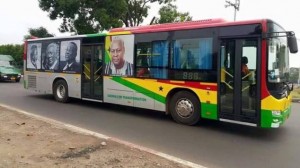Court orders disclosure of Smartyy’s bus rebranding contract
 A human rights court has ordered the disclosure of the controversial contract between the Ministry of Transport and Smartyy’s Productions for the rebranding of 116 buses, and documents relating to the contract, following legal action by seven Ghanaians.
A human rights court has ordered the disclosure of the controversial contract between the Ministry of Transport and Smartyy’s Productions for the rebranding of 116 buses, and documents relating to the contract, following legal action by seven Ghanaians.
The Ministry of Transport and the Attorney General are to make the bus branding contract absolutely available to the seven in 14 days. Other documents relating to the contract are however to be made available subject to prohibition of their disclosure by other laws and the propensity of such disclosures to cause harm.
The court also ordered that the respondents answer in writing, whether or not the award of the contract was done in adherence to the Public Procurement Act 2003 (Act 663), whether or not the contract procurement was competitive or sole sourced, and whether or not there were other alternatives to the contract.
The overpriced contract which led to the resignation of then Transport Minister, Dzifa Attivor, involved the rebranding of the buses in Ghana’s colours and images of past heads of state and current President John Dramani Mahama.
CitizenGhana Movement – the seven who sued the Minister of Transport and the Attorney General – are Kathleen Addy, Lolan Ekow Sagoe-Moses, Francis Kennedy Ocloo, Yaw Baffour Ankomah, Evans Amegashie, Kwame Barkers Ansah and Michael Annor.
Represented by Kofi Bentil and Nana Akwasi Awuah, the seven were seeking to ascertain the details around the bus branding contract in pursuit of their civic responsibility to protect and preserve public property and combat the misuse and waste of public funds and property [Article 41 (f), 1992 Constitution].
In their defence, counsel for the respondents had argued among others, that the right to information as captured in Article 21 (1)(f) of the 1992 Constitution is “subject to such qualifications and laws as are necessary in a democratic society.”
However the presiding judge, Justice Anthony Yeboah, noted that the right to information is first a human right, and secondarily a constitutional one, and the state ought not to be allowed to benefit from its own failure to pass a Right to Information Act by using the law’s absence to deny requests for information.
“The individual does not need a Freedom of Information Act to enjoy the right to information in Ghana,” he declared.
“Accordingly, it is not the law that in the absence of a freedom of information legislation, a person in Ghana is bereft of the right to information. In Ghana, every person, including journalists, is entitled to a human and constitutional right to information even in the absence of further legislation. The phrase ‘subject to’ simply indicates that a law may be passed to which this right to information may be subservient.”
Background
It emerged in parliament that government had spent ȼ3.6 million of oil revenue on the rebranding of 116 buses.
The contract for the branding of the buses was awarded to Smartyy’s Productions, owned by actress Selassie Ibrahim, which then sub-contracted another firm, Crystal Concepts, to do the real work at far lower cost, offering them meagre remuneration for the transformation of the buses.
Whereas government spent about GHȼ 31,000 rebranding each bus, Crystal Concepts claimed to have charged GHȼ1,600 per bus.
The Attorney General subsequently probed the matter at the behest of the Chief of Staff Mr Julius Debrah and determined an amount of GHȼ1,548,608.04 to be retrieved from Smartyy’s Productions for the overpriced exercise, to which Smartyy’s lawyers submitted and carried out a three-instalment payment plan.
By Emmanuel Odonkor
